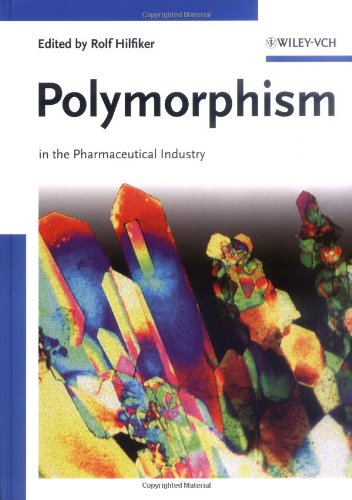Polymorphism in the pharmaceutical industry pdf free
Par ingram william le jeudi, mai 26 2016, 07:27 - Lien permanent
Polymorphism in the pharmaceutical industry. Rolf Hilfiker

Polymorphism.in.the.pharmaceutical.industry.pdf
ISBN: 3527311467,9783527311460 | 433 pages | 11 Mb

Polymorphism in the pharmaceutical industry Rolf Hilfiker
Publisher: Wiley-VCH
The knowledge of the effects of polymorphism of genes for the enzymes involved in drug metabolism, like those belonging to the family of cytochrome P450 can be applied in drug delivery, development and the clinical use of drugs. Through this post, he gives special emphasis on the recent landmark case of Roche v Cipla, which created quite a stir in the pharmaceutical industry. The isolation of human cytochrome P450s by the Guengerich group introduced a way for the pharmaceutical industry to test drugs for human toxicity before they are developed and released into the market. Science, growing awareness of patients' needs, the hesitant but increasingly interested pharmaceutical industry, and government agencies are forging a movement towards personalization of drug treatments. The knowledge of the effects of polymorphisms of genes for the enzymes is applied in drug discovery and development as well as in clinical use of drugs. Polymorphism of drugs has been the subject of intense interest in the pharmaceutical industry for over forty years. Purification and Characterization of Allan Conney at Rutgers University. Another classic pharmacogenetic example is the study of thiopurine S-methyltransferase (TPMT, an enzyme which transfers methyl groups [CH3] to a sulphur-containing purine residue) genetic polymorphism (Figure 2A) (Weinshilboum and Sladek, 1980). Noted that “we plan to take the lead in providing the pharmaceutical and biotechnology industry with well-characterized, predictive biomarker panels composed of both genetic polymorphisms and gene expression patterns. The benefits of pharmacogenomics are numerous. It is an unfortunate reality that with so much disinformation being spread by the media, the medical establishment, and the pharmaceutical industries, it is becoming more and more difficult to take at face value anything that comes out of their mouths. Pharmaceutical companies could exclude those people who are known to have a negative response to the drug, from the clinical trials. In Taiwan, the To establish a pharmacogenomic DNA bank and a single nucleotide polymorphisms library3 could be a millstone for Taiwan to develop biomedical and biopharmaceutical industries and then become the main Asian center for clinical trial and drug testing for Chinese populations. Guengerich Human Liver Microsomal Cytochrome P-450 Mephenytoin 4-Hydroxylase, a Prototype of Genetic Polymorphism in Oxidative Drug Metabolism. As a case in point, the UK genetic data bank explicitly claims that involvement of the pharmaceutical and biotechnology industry in the project is crucial for its success. Abstract: The polymorphic stability of a drug substance is a very important topic in the pharmaceutical industry. Cost-effective methods for genotyping are being developed and it would For the pharmaceutical companies, segmentation of the market may not leave room for conventional blockbusters but smaller and exclusive markets for personalized medicines would be profitable.
Aerosol Technology: Properties, Behavior, and Measurement of Airborne Particles pdf download